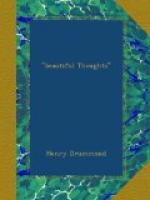July 20th. Who has not come to the conclusion that he is but a part, a fraction of some larger whole? Who does not miss, at every turn of his life, an absent God? That man is but a part, he knows, for there is room in him for more. That God is the other part, he feels, because at times He satisfies his need. Who does not tremble often under that sicklier symptom of his incompleteness, his want of spiritual energy, his helplessness with sin? But now he understands both—the void in his life, the powerlessness of his will. He understands that, like all other energy, Spiritual power is contained in Environment. He finds here at last the true root of all human frailty, emptiness, nothingness, sin. This is why “without Me ye can do nothing.” Powerlessness is the normal state, not only of this, but of every organism—of every organism apart from its Environment. Natural Law, p. 268.
July 21st. Friendship is the nearest thing we know to what religion is. God is love. And to make religion akin to Friendship is simply to give it the highest expression conceivable by man. The Changed Life, p. 49.
July 22d. The entire dependence of the soul upon God is not an exceptional mystery, nor is man’s helplessness an arbitrary and unprecedented phenomenon. It is the law of all Nature. The spiritual man is not taxed beyond the natural. He is not purposely handicapped by singular limitations or unusual incapacities. God has not designedly made the religious life as hard as possible. The arrangements for the spiritual life are the same as for the natural life. When, in their hours of unbelief, men challenge their Creator for placing the obstacle of human frailty in the way of their highest development, their protest is against the order of Nature. Natural Law, p. 269.
July 23d. The organism must either depend on his environment, or be self-sufficient. But who will not rather approve the arrangement by which man in his creatural life may have unbroken access to an Infinite Power? What soul will seek to remain self-luminous when it knows that “The Lord God is a Sun?” Who will not willingly exchange his shallow vessel for Christ’s well of living water. Natural Law, p. 270.
July 24th. The New Testament is nowhere more impressive than where it insists on the fact of man’s dependence. In its view the first step in religion is for man to feel his helplessness. Christ’s first beatitude is to the poor in spirit. The condition of entrance into the spiritual kingdom is to possess the child-spirit—that state of mind combining at once the profoundest helplessness with the most artless feeling of dependence. Natural Law, p. 271.
July 25th. Fruit-bearing without Christ is not an improbability, but an impossibility. As well expect the natural fruit to flourish without air and heat, without soil and sunshine. How thoroughly also Paul grasped this truth is apparent from a hundred pregnant passages in which he echoes his Master’s teaching. To him life was hid with Christ in God. And that he embraced this, not as a theory but as an experimental truth, we gather from his constant confession, “When I am weak, then am I strong.” Natural Law, p. 271.




